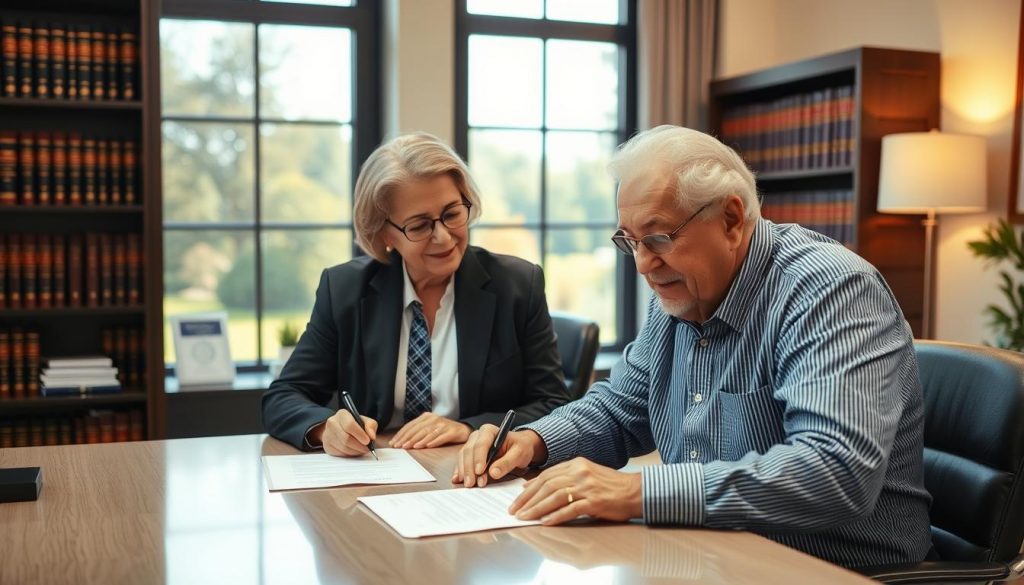As our parents age, ensuring their welfare and financial security becomes a pressing concern. We must consider how to safeguard their future, making informed decisions on their behalf if needed. A Lasting Power of Attorney (LPA) is a crucial tool that enables individuals to plan ahead, choosing who they trust to make important decisions regarding their financial, property, and health matters.
By setting up an LPA, elderly parents can maintain control over their lives while providing their loved ones with the authority to act in their best interests if they lose mental capacity. For more detailed information on the process and benefits, you can visit Age UK’s guide on Power of, which offers comprehensive insights into the different types of attorney and the registration process.
Key Takeaways
- An LPA allows elderly parents to choose who makes decisions on their behalf.
- It covers financial decisions and health and care decisions.
- Setting up an LPA requires registering with the Office of the Public Guardian.
- The cost to register an LPA is £82, with potential discounts for low-income individuals.
- Choosing the right attorney is crucial for making decisions in the best interests of the elderly parent.
Understanding Power of Attorney for Elderly Parents
Understanding the legal authority for elderly parents is essential, especially when it comes to making crucial decisions on their behalf. As individuals age, they may lose mental capacity, making it challenging to manage their affairs.
Having mental capacity means being able to make your own decisions and understand the consequences of those decisions. If you have mental capacity, you have the right to make your own decisions. However, when an individual loses mental capacity, they may no longer be able to manage their financial, legal, and personal matters.

Definition and Purpose
A power of attorney is a legal document that grants someone the authority to act on behalf of another person, making decisions regarding their financial, legal, and personal affairs. The purpose of a power of attorney is to ensure that the affairs of an individual are managed properly, even if they lose mental capacity.
The person granting the power of attorney is known as the donor, while the individual appointed to act on their behalf is called the attorney. The attorney’s role is to make decisions in the best interest of the donor, adhering to the principles of the Mental Capacity Act 2005.
Importance of Having a Power of Attorney
Having a power of attorney in place is crucial for elderly parents who may lose mental capacity. It allows them to choose who will make decisions on their behalf, ensuring that their wishes are respected. Without a power of attorney, family members may need to apply to the Court of Protection to be appointed as a deputy, which can be a lengthy and costly process.
By having a power of attorney, individuals can rest assured that their affairs will be managed according to their wishes, even if they are no longer able to make decisions for themselves. This provides peace of mind not only for the individual but also for their family members, who can be confident that their loved one’s needs are being met.
Types of Power of Attorney
There are multiple types of power of attorney, and selecting the right one depends on your elderly parent’s specific needs and circumstances. Appointing a power of attorney is a significant decision that requires understanding the different options available.

Ordinary Power of Attorney
An Ordinary Power of Attorney grants someone the authority to manage an individual’s financial affairs and other decisions for a specified period. It is typically used for temporary situations, such as when the individual is abroad or unable to manage their affairs due to illness.
Key characteristics include:
- It is usually time-limited or event-specific.
- The individual granting the power must have mental capacity.
- It becomes invalid if the individual loses mental capacity.
Lasting Power of Attorney (LPA)
A Lasting Power of Attorney allows your elderly parent to appoint one or more individuals to make decisions on their behalf in the event they lose mental capacity. There are two types of LPA: one for property and financial affairs, and another for health and welfare.
Benefits of LPA include:
- It remains valid even if the individual loses mental capacity.
- It allows for the appointment of attorneys to make both financial and health-related decisions.
- It provides a safeguard against potential abuse by ensuring that the individual’s wishes are respected.
Enduring Power of Attorney
An Enduring Power of Attorney was a legal document used before the introduction of Lasting Power of Attorney. Although it is no longer available for new appointments, existing Enduring Power of Attorney documents remain valid.
“If your elderly parent has an existing Enduring Power of Attorney, it is still legally valid, but they may wish to consider updating to a Lasting Power of Attorney for broader coverage.”
In conclusion, understanding the different types of power of attorney is crucial when considering appointing a power of attorney for your elderly parent. Each type serves different needs and offers various levels of protection and flexibility.
When to Consider Power of Attorney
Recognising the right moment to consider power of attorney is crucial for families. Caring for elderly parents can feel overwhelming, especially if you’re anticipating a potential loss of their mental capacity due to conditions like Parkinson’s, Alzheimer’s, or dementia.
As we navigate the challenges of supporting our ageing parents, it’s essential to identify the signs that indicate they may need legal representation. This not only ensures their well-being but also safeguards their financial and personal interests.
Signs Your Elderly Parent Needs Representation
Several indicators suggest that an elderly parent may require the support of a power of attorney. These include:
- Difficulty managing financial affairs, such as paying bills or managing investments.
- Struggling with daily tasks, like cooking, cleaning, or personal care.
- Showing signs of cognitive decline, such as memory loss or confusion.
- Having trouble making informed decisions about their health or welfare.
If you notice any of these signs, it’s vital to consider when power of attorney is needed to protect their interests.
Timing: When to Act
The timing of setting up a power of attorney is critical. Ideally, this should be done before your parent loses mental capacity, as it becomes much more complicated once they lack the capacity to make decisions.
To help you understand the importance of timing, consider the following table:
| Timing | Implications | Actions |
|---|---|---|
| Before Mental Incapacity | Parent can make informed decisions about granting power of attorney. | Discuss and agree on power of attorney arrangements with your parent. |
| After Mental Incapacity | Parent cannot make decisions; legal processes become more complex. | Explore alternative legal options, such as deputyship, with professional guidance. |

By understanding the signs that indicate the need for representation and acting at the right time, you can ensure that your elderly parent receives the support they need while protecting their autonomy.
Legal Framework in the UK
For families in the UK, understanding the legal framework of Power of Attorney is essential for making informed decisions about their elderly parents’ welfare. The legal framework is designed to protect individuals who lack mental capacity, ensuring their rights are respected and their best interests are maintained.
The Mental Capacity Act 2005
The Mental Capacity Act 2005 is a crucial piece of legislation that provides a framework for making decisions on behalf of individuals who lack mental capacity. This Act is fundamental in guiding how a Power of Attorney should be established and operated.
The Act is based on five key principles:
- A person is assumed to have capacity unless it is established that they lack capacity.
- All reasonable steps should be taken to help someone make a decision before concluding they lack capacity.
- A person has the right to make what might be seen as an unwise decision.
- Any decision made on behalf of someone who lacks capacity must be in their best interests.
- The decision made should be the least restrictive option.
Key Legal Requirements
To set up a Power of Attorney, certain legal requirements must be met. The individual granting the Power of Attorney (the donor) must have the mental capacity to understand the nature and implications of the document they are signing. The legal guardianship for parent involves understanding the responsibilities and powers being granted to the attorney.
The process involves several key steps, including:
- Choosing an appropriate attorney.
- Completing the relevant application forms.
- Registering the Lasting Power of Attorney (LPA) with the Office of the Public Guardian.
Understanding these legal requirements is vital to ensure that the Power of Attorney is valid and effective.
Setting Up a Lasting Power of Attorney
A Lasting Power of Attorney is a vital legal tool that allows your elderly parent to appoint someone they trust to make decisions on their behalf.
To set up an LPA, you’ll need to follow a straightforward process. This involves obtaining the necessary forms, choosing the type of LPA, filling out the forms, appointing certificate providers, and registering the LPA with the Office of the Public Guardian.
Step-by-Step Guide
- Obtain the LPA Forms: You can either download the LPA forms and information pack from the Office of the Public Guardian’s website or order them by calling 0300 456 0300.
- Choose the Type of LPA: Decide whether you need a Health and Welfare LPA or a Property and Financial Affairs LPA.
- Fill Out the Forms: Carefully complete the LPA forms, ensuring all details are accurate.
- Appoint Certificate Providers: Identify individuals who can verify the information provided in the LPA forms.
- Register the LPA: Submit the completed LPA forms to the Office of the Public Guardian for registration.
Choosing an Attorney
Choosing the right attorney is crucial. Your elderly parent should select someone they trust to make decisions in their best interest.
| Criteria | Description |
|---|---|
| Trustworthiness | The attorney should be someone your parent trusts implicitly. |
| Capability | They should be capable of managing your parent’s affairs, whether financial or personal. |
| Availability | The chosen attorney should be available to act when needed. |

By following these steps and carefully choosing an attorney, your elderly parent can ensure that their affairs are managed according to their wishes.
Responsibilities of an Attorney
As an attorney, your responsibilities are not just legal but also deeply personal, requiring a high level of care and integrity. When you take on this role, you are entrusted with making decisions on behalf of the donor, which can include managing their financial affairs, property, and personal welfare.
Duties and Powers of an Attorney
The duties and powers of an attorney are outlined in the Mental Capacity Act 2005 and its code of practice. Your primary duty is to act in the best interests of the donor, making decisions that they would have made if they had the capacity.
- To manage the donor’s financial affairs, including paying bills and collecting income.
- To make decisions about the donor’s property, such as selling or maintaining it.
- To make personal welfare decisions, including those related to healthcare and living arrangements.
It’s crucial to understand that your role as an attorney is not just about managing the donor’s affairs but also about respecting their wishes and promoting their well-being. For more detailed information on the role of a power of attorney, you can visit https://mpestateplanning.uk/what-power-of-attorney-does/.
Legal and Ethical Considerations
As an attorney, you must adhere to certain legal and ethical principles. This includes acting with honesty and integrity, avoiding conflicts of interest, and keeping the donor’s affairs confidential.
“An attorney must not benefit personally from their position, unless authorised to do so by the donor or the Court of Protection.”
Furthermore, you must be mindful of the donor’s rights and ensure that their autonomy is respected as much as possible. This involves keeping them informed and involving them in decision-making processes whenever feasible.

In summary, being an attorney is a significant responsibility that requires a deep understanding of your duties and powers, as well as the legal and ethical considerations that guide your actions. By acting in the best interests of the donor and adhering to the principles outlined in the Mental Capacity Act 2005, you can ensure that you are fulfilling your role effectively.
The Role of the Office of the Public Guardian
The Office of the Public Guardian plays a pivotal role in the registration process of lasting powers of attorney. As part of the Ministry of Justice, it is responsible for registering lasting powers of attorney and investigating allegations of abuse.
What They Do
The Office of the Public Guardian has several key responsibilities. It registers lasting powers of attorney, ensuring that the attorney and the donor understand their roles and responsibilities. It also supervises attorneys and deputies appointed by the Court of Protection, investigating any concerns or allegations of abuse.
Key functions include:
- Registering lasting powers of attorney
- Supervising attorneys and deputies
- Investigating allegations of abuse
As stated by the Office of the Public Guardian, “We work to protect the rights of people who lack mental capacity and to promote their well-being.” This underscores the importance of their role in safeguarding vulnerable individuals.
How to Register an LPA
Registering a lasting power of attorney involves several steps. First, the donor and the attorney must agree on the terms and sign the document. Then, the LPA must be registered with the Office of the Public Guardian. This process involves submitting the necessary forms and paying the required fee.
It’s crucial to ensure that all documents are correctly filled out to avoid delays. The registration process can take several weeks, so it’s essential to plan ahead.
As
“The registration of a lasting power of attorney is a significant step in ensuring that the donor’s affairs are managed according to their wishes.”
This highlights the importance of careful planning and the role of the Office of the Public Guardian in this process.
By understanding the role of the Office of the Public Guardian and the process of registering a lasting power of attorney, individuals can better plan for the future and ensure that their loved ones are protected.
Revoking or Changing Power of Attorney
As circumstances change, it may become necessary to revoke or alter a power of attorney to safeguard your elderly parents’ future. Whether due to a change in your parent’s mental capacity, a shift in their financial situation, or a reevaluation of the chosen attorney, understanding the process of revocation or modification is crucial.
Circumstances for Revocation
There are several situations where revoking a power of attorney might be necessary. For instance, if the appointed attorney is no longer able or willing to act, or if there’s a change in the donor’s mental capacity, revocation may be considered. Additionally, if the donor’s circumstances or wishes change, they may wish to revoke the existing arrangement and establish a new one.
Key reasons for revocation include:
- The attorney is no longer able or willing to act.
- A change in the donor’s mental capacity.
- A shift in the donor’s financial situation or personal wishes.
- A breakdown in the relationship between the donor and the attorney.
It’s essential to note that the donor must have mental capacity to revoke a lasting power of attorney. If they lack capacity, alternative measures must be explored.
“The donor must have the mental capacity to revoke a lasting power of attorney.”
Process for Making Changes
Revoking or changing a lasting power of attorney involves several steps. First, the donor must confirm their intention to revoke the arrangement. This is typically done in writing, using a deed of revocation. The donor must then notify the relevant parties, including the Office of the Public Guardian (OPG) if the LPA is registered, and any institutions or individuals who have been dealing with the attorney.
The process can be complex, and it’s advisable to seek professional guidance to ensure that all legal requirements are met. The following table outlines the key steps involved in revoking a lasting power of attorney:
| Step | Description |
|---|---|
| 1. Confirm Intention | The donor confirms their intention to revoke the LPA in writing. |
| 2. Notify Relevant Parties | Notify the OPG, attorneys, and any relevant institutions. |
| 3. Execute Deed of Revocation | The donor executes a deed of revocation to formally revoke the LPA. |
| 4. Update Records | Ensure that all relevant records and institutions are updated regarding the revocation. |
It’s also worth noting that while revoking a power of attorney, it’s an opportune time to review and potentially update other aspects of your parent’s estate planning, ensuring that everything remains aligned with their current wishes and circumstances.
Common Misconceptions
There’s a significant amount of misinformation surrounding Power of Attorney, which we aim to clarify. Many individuals are uncertain about the role and implications of granting or holding a Power of Attorney, often due to prevalent myths and misunderstandings.
Myths About Power of Attorney
One common myth is that a Lasting Power of Attorney (LPA) gives the appointed attorney absolute control over the donor’s affairs. In reality, an LPA is designed to allow the attorney to act in the best interest of the donor, making decisions that respect the donor’s wishes as much as possible.
Another misconception is that creating an LPA is a complex and costly process. While it’s true that setting up an LPA requires some formalities, it’s not necessarily complicated or expensive. For instance, the difference between Lasting and Enduring Power of is crucial to understand, and clarifying such distinctions can simplify the process.
Clarifying Confusions
Some people believe that a Power of Attorney is only for the elderly or those with significant wealth. However, anyone can benefit from having a Power of Attorney, as it provides a safeguard against unforeseen circumstances that could affect anyone, regardless of age or financial status.
- A Power of Attorney allows you to choose who makes decisions on your behalf.
- It can be tailored to specific circumstances, such as financial or health decisions.
- Having a Power of Attorney in place can prevent costly and stressful legal disputes.
By understanding the realities of Power of Attorney and dispelling common myths, individuals can make more informed decisions about their future and the future of their loved ones.
Supporting Your Elderly Parent in Decision-Making
Supporting our elderly parents in their decision-making processes is vital for their dignity and autonomy. As we care for our loved ones, it’s essential to understand the importance of empowering them to make choices about their lives.
An LPA empowers individuals to feel confident in their decisions regarding their healthcare and finances. By supporting our elderly parents, we can help them maintain their independence and make informed decisions about their care.
Encouraging Independence
Encouraging independence in elderly parents is crucial for their well-being. We can achieve this by:
- Allowing them to make their own decisions whenever possible
- Providing support and guidance without being overly directive
- Helping them to stay connected with their community and friends
By doing so, we not only enhance their quality of life but also ensure that they feel valued and respected.
Empowering Their Choices
Empowering elderly parents involves more than just giving them the authority to make decisions; it’s about creating an environment where they feel confident and supported in their choices.
This can be achieved by:
- Listening to their concerns and wishes
- Providing them with the necessary information to make informed decisions
- Respecting their decisions and avoiding undue influence
By empowering our elderly parents, we can ensure that their rights and preferences are respected, even as their needs change over time.
Resources for Further Information
When dealing with the sensitive topic of power of attorney for elderly parents, having access to reliable resources is invaluable.
Legal Resources and Support
Several legal resources are available to guide you through the process of setting up a power of attorney. These include:
- Age UK: Offers guidance on legal matters affecting older individuals, including power of attorney.
- The Law Society: Provides a directory of solicitors specialising in elder law and power of attorney.
- Citizens Advice: Gives free, independent advice on legal matters, including power of attorney and elderly care.
Organisations That Can Assist
Beyond legal resources, various organisations offer support and guidance for elderly care and power of attorney matters:
- Alzheimer’s Society: Provides support and resources for families dealing with dementia, including guidance on power of attorney.
- Carers UK: Offers advice and support for carers, including information on navigating power of attorney.
- The Office of the Public Guardian (OPG): Responsible for registering lasting powers of attorney and providing guidance on the role of an attorney.
For visual guidance, here is an overview of the key resources:
These resources are designed to provide comprehensive support and guidance as you navigate the complexities of power of attorney for your elderly parents.
Conclusion: The Importance of Planning Ahead
Planning ahead with a power of attorney can provide peace of mind for families and ensure that an elderly parent’s wishes are respected. As we have discussed, having a power of attorney in place is crucial for safeguarding the future of elderly parents.
Securing Their Future
By setting up a lasting power of attorney, families can ensure that their loved ones receive the care and support they need. This involves having open and honest family discussions about power of attorney, which is essential for making informed decisions.
Family Unity Through Planning
Discussing power of attorney within the family helps to prevent potential conflicts and ensures that everyone is on the same page. The importance of planning ahead cannot be overstated, as it allows families to make decisions that align with their elderly parent’s best interests.
By prioritizing family discussions about power of attorney, we can work together to secure a more stable and supportive environment for our elderly loved ones.


